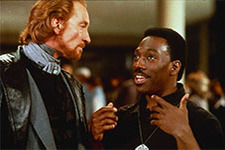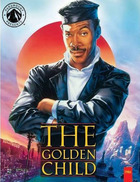The Golden Child
|  “Eddie Murphy is the Chosen One” proclaimed the one sheets and trailers for The Golden Child, which pretty much summarizes the film’s goal and its appeal. Murphy had shot to massive stardom in the early 1980s playing cocksure outsiders upending various systems in 48 Hrs. (1982), Trading Places (1983), and Beverly Hills Cop (1984), the latter of which was the highest grossing film of that year and established sky-high expectations for any subsequent Murphy starring vehicle. In hindsight, The Golden Child, an effects-heavy action-fantasy hybrid, feels like a particularly strange film for the comedian-star, and the fact that it failed to live up to Cop’s boffo box office proved an early stumble for Murphy (although it should be noted that it still ranked in the top 10 for 1986 and was the eighth highest selling video title of 1987). Like Beverly Hills Cop, which was the first feature film produced in association with Eddie Murphy’s production company, The Golden Child was retrofitted for Murphy. The screenplay by Dennis Feldman, who had previously written the teen comedy Just One of the Guys (1985) and would go on to specialize in sci-fi/horror hybrids like Species (1995) and Virus (1999), was originally conceived as a straightforward fantasy film. Once Murphy became interested in the project, the script was retooled to accommodate his comic persona, which doesn’t always sit comfortably with its action-fantasy components (there is a surprising amount of blood throughout the film, and the bombast of the special-effects-heavy climax leaves little room for jokes). Nevertheless, if Murphy could be inserted into a project originally intended for Sylvester Stallone, as was the case with Cop, surely he could integrate himself into the exotic supernaturalism of The Golden Child. Murphy plays Chandler Jarrell, a Los Angeles social worker who specializes in missing children and is drawn into a plot involving the eponymous child (J.L. Reate), a mystical Tibetan tyke who is kidnapped by Sardo Numspa (Charles Dance), a demon in human form who wants to kill him and take his powers. Chandler is approached by Kee Nang (Charlotte Lewis), a young woman with secret connections to the Golden Child, to aid in his rescue. Her informing Chandler that he is “the chosen one” is met with expected bemusement, although like any secular character in a horror or fantasy film, Chandler will soon learn that his understanding of the world is severely limited. In fact, much of the film’s comedy derives from Chandler’s overconfidence in his conception of reality and the laws of physics being constantly undercut by the supernatural world into which he is thrust. The payoff of this comedic gambit is uneven, with some scenes working fantastically, while others just feel forced. There are some sly challenges to Chandler’s status as traditional masculine hero when Kee regularly demonstrates her superior physicality and fighting ability against Chandler’s constant admonition for her to “stay in the car” (her becoming his romantic love interest is not unexpected, but Murphy and Lewis have no chemistry, so it feels like nothing more than a de rigeur plot point). At other times Murphy just plays scenes loud and jarring, which probably satiated his fans at the time, but now feel like lazy gambits that rely too heavily on Murphy’s already established Axel Foley persona. Some of the best scenes involve Murphy and Dance going toe to toe, with Dance playing up Sardo’s campy continental villainy while Murphy blithely insults him at every turn, completely unaware of just how powerful he is (the surprised and peeved flick of Dance’s eyes in the airport scene when Murphy kisses him is priceless). Director Michael Ritchie had graduated from the ranks of television in the late 1960s with a series of challenging dramas and prescient comedies, including Downhill Racer (1969), The Candidate (1972), and The Bad News Bears (1976). By the time he helmed The Golden Child, his New Wave flourishes and stabs at social and political satire were long gone, as he had settled into a safe harbor of high-concept comedies built around established comic actors, including The Survivors (1983) with Walter Matthau and Robin Williams, Fletch (1985) with Chevy Chase, and Wildcats (1986) with Goldie Hawn. With The Golden Child, Ritchie mostly sits back and lets the large sets, big special effects (which tody have not aged well despite being the work of Lucasfilm’s Industrial Light & Magic), and mega-star do the heavy lifting. And The Golden Child is, at heart and in essence, an Eddie Murphy vehicle through and through, with little holding it together outside of the familiar cadences of his streetwise confidence and infectious laugh. In an interview during the film’s production, Murphy admits as much, telling the interviewer that he is first and foremost a stand-up comedian and he doesn’t think of himself as an actor at all. The character he is playing is really just a name attached to the persona of Eddie Murphy. As he puts it, “I don’t become Chandler Jarrell, I don’t become the character in the film. That’s my name, but I think pretty much the audience, if they’re coming to see the picture, I’m Eddie Murphy in the film.” In other words, it didn’t matter if he was battling snobbish Beverly Hills police officers, filthy rich investment tycoons, or human-disguised demons. What people wanted was Eddie Murphy, and that is exactly what they got here.
Copyright © 2020 James Kendrick Thoughts? E-mail James Kendrick All images copyright © Paramount Home Entertainment | |||||||||||||||||||||||||||||
Overall Rating: 
 (2)
(2)


